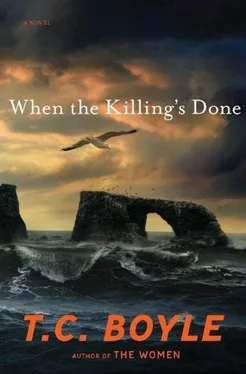“Jesus, Alma,” Frazier roars out, his face red and getting redder, “we thought you’d gone and given birth to triplets back there — just toughed it out and bit off the umbilical all on your own.” He mugs for the others, shifting the glass from his right hand to his left as he crosses the room to her, spreads his fingers wide across the swell of her abdomen and crows, “Nope, they’re still in there, folks. And I don’t blame them — what baby in his right mind would want to come out and face this bloody bunch of drunks and bush crazies?”
“Speak for yourself,” somebody says, and the laughter is general.
Annabelle floats in to intercede, playfully pushing Frazier away from her and holding up a bottle for Alma’s inspection. “Sparkling cider, non-alcoholic. Thought you might want a glass — do you?”
“Yes, that would be nice,” she says, her voice soft and delicate, a flutter in her own ears. “If anybody left me a clean glass, that is.”
A hoot from A.P., who makes a show of throwing back his wine in a gulp, then getting up to wash the glass at the tap and elaborately dry it with the one semi-clean corner of the dishtowel before handing it to her with a flourish. Annabelle is right there on cue, moving in with the bottle to fill the glass and call for a toast. “To Alma,” she says. “And the baby!”
“Or babies,” Frazier puts in.
“Easy for you to say”—Annabelle bends to refill her own glass from the nearest bottle of pinot grigio—“but you’re not the one who has to carry all that weight around.” She pauses, reconsidering, and reaches out to pat his midsection. “Though on second thought. .”
“Not me, I swear I’m not pregnant.”
“Sextuplets!” A.P. shouts. “Anything less is, is”—he’s weaving, grinning, trying to drink from the neck of the bottle and make sense at the same time—“insupportable. Or unsustainable. Or, or — whatever.”
She’s due in two and a half weeks. Everyone’s aware of that, even Freeman Lorber, who tried his best to assert his authority over her and for the first few weeks after she began showing kept insisting he’d be best man at the wedding till she let him know that there wasn’t going to be a wedding and it was none of his business in any case. All you need to worry about , she told him, and she’d let her voice harden till there was no coming back, is who’s going to look after things when I’m on maternity leave — which is only going to be a week, five working days, so don’t get that look on your face . If there are any surprises — if she should go into early labor and she happens to be here on the island — there’ll be plenty of time to get back to the mainland, if not by boat, then helicopter. But that’s not going to happen because she’ll be back at home for the last week and her mother will be there with her. And Ed. Ed, with the car gassed and tires inflated, already primed to floor it all the way to the hospital.
After dinner, she takes a chair outside to sit and watch the light change over the rise behind the bunkhouse. Her book is back on her bed, but she doesn’t need a book, not here, not tonight. Everything is still, the swallows back in their nests, the grasshoppers that the foxes so love to crush between their teeth settling down in the high yellow grass, the colors of the buildings and the fields and the chaparral shifting and melding in exactly the way of the Diebenkorn paintings hanging in the main house — and Diebenkorn stayed here, right here, walked this very ground, a friend and guest of Carey Stanton in the time before all this became public land, or at least held in trust for the public. She’s thinking about that, about capturing this scene, the sweep and solace of it, in oils or even pencil, how very nearly impossible that must be, and of her last attempts at figurative art, in the seventh or eighth grade, which wound up looking more like abstract expressionism, when one of the fox girls, Allison, comes out to join her.
The light has begun to fade, bats careering across the open spaces, a cool current of sea air creeping up the pass from the ocean. Allison — a smoker — settles in on the ground beside her, resting her back up against the rough stucco wall. “Do you mind?” she asks, waving the unlit cigarette at her.
“No, go ahead,” she says, but she can’t help feeling the slightest tick of annoyance. Couldn’t she smoke out back? Up on top of the ridge? On one of the buoys in the channel? Anywhere but here?
“I mean, I’m downwind of you, I’m pretty sure.” There’s the flare of the match, the pursed lips, the sharp assaultive odor of charred weed, and then it’s gone, drifting along the base of the house like a spirit summoned and dismissed.
For a moment they’re silent, Alma staring off across the expanse of the yard to where the compost bin rises up like a building itself, Allison absorbed in her cigarette. The bats ricochet off nothing, the shadows go one degree denser. Then, just to say something, to be gracious and welcoming instead of merely old, pregnant and bearish, Alma says, “Dinner was great. You guys really outdid yourselves.”
“You like it?”
“I think I ate too much.”
“Yeah, I mean, when Marg and I saw the rockfish A.P. caught we figured bread it, flash-fry it and then set it aside so it won’t get soggy, then the rest was easy, your standard stir-fry with brown rice. And wine.” She lets out a laugh. “Enough wine and anything tastes good.” Allison’s a blonde, what Alma’s mother would call a dirty blonde, thin-faced and pretty and no older than the girl Dave LaJoy brought out here to die.
“Well, whatever,” Alma says, “you were inspired tonight. Really, you guys should open your own restaurant.”
But Allison doesn’t respond. She’s looking off in the direction of the compost bin. “What’s that,” she says in a whisper, “a fox? Or no, that can’t be a fox, can it?”
The foxes, used to a free handout when they were caged, are common around the ranch now, even in daylight. Alma has identified six different individuals making the rounds of the compost every night, delicately gourmandizing on the leftovers, which tonight would feature a certain irresistible quantity of rockfish skin, guts and bone. But Allison — she’s a fox girl, after all — is right. Even without her glasses, Alma can see that. This is no fox. The movement is all wrong, too humped and discontinuous, not nearly fluid enough. “Skunk,” Alma says, rising from the chair in the same moment Allison unfolds herself from the ground to stand there beside her. “What else could it be?”
And that’s when things become interesting, the two of them advancing cautiously across the drive and up the slight rise where the seasonal grasses have been scythed to yellow stumps and the occasional eruption of hacked fennel shows itself like a clenched green fist, the going unsteady, the fading light playing tricks with their eyes. Both are trying to minimize their movements as in some children’s game, red light-green light, keeping their arms at their sides and freezing in place after each step. The bin is no more than fifty feet away now. They’re squinting their eyes to focus against the descending screen of the night, but even in the diminished light it becomes apparent to both of them that this creature, working its paws like a peasant woman bent over her wash on the banks of a nighttime river, is neither fox nor skunk. For one thing, it’s too big. And the movement is all wrong. The fur. The way it sits back on its haunches while it eats. For an instant, puzzlement giving way to outrage, Alma sees a dog there before her, a ragged stinking disease-spreading mongrel some idiot boater set loose without a thought to the consequences, to the disaster canine distemper or parvovirus could wreak on the fox population, but then she sees that this is no dog either. Amazingly, bewilderingly, it seems to be something else altogether. Something with a mask and articulated fingers and a long striped bushed-out tail.
Читать дальше












